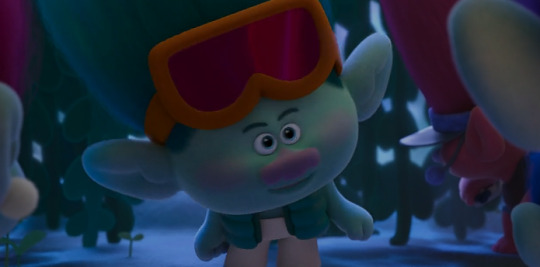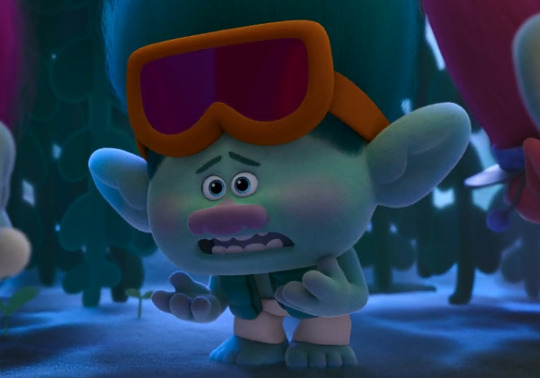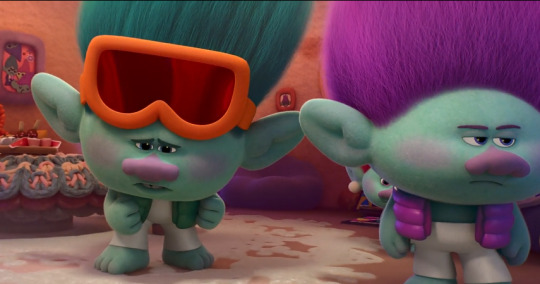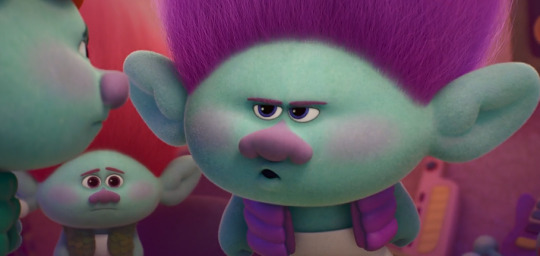#the perfect family harmony as a bazooka
Text
This is gonna sound SOOO off or smthn but
Was the Perfect Family Harmony planned to be a weapon against the Bergens?
Long post ahead bc brain is rotting
Ok so as we know, the Perfect Family Harmony is smthn that's so powerful that its capable of shattering diamonds. Not just that but its one of the only thing capable of doing so(according to Floyd it was the only thing but giving the benefit of the doubt)
So we know its strong, and we saw it blasting off Velvet and Veneer off their platforms when they performed it, and they weren't even the targets, they were blasted away by just the shockwave that came with using it.

"Its that powerful."
Ok, so its definitely powerful enough to be used as a weapon right? Yeah it was relatively safe enough to use in front of a crowd, else they wouldn't have tried to do it during a concert, but that could just be when those harmonizing aren't targeting anything.
If it could shatter diamonds, how easily could it break cages? What would it do if it was used to target a Bergen? A whole Kingdom of Bergens?
Lets also go back to that concert, to that time John was obsessed with them getting it right. They were in the Troll tree, in Bergentown, a place where any of them could die during Trollstice. The Bergens were a huge threat, something that trolls, at their size, couldn't fight back against normally so they had to run instead right?
But what if they COULD fight back? What if they had a weapon so powerful that it might finally be able to free them? To defeat the monsters that tortured their kind for centuries?
What if John Dory found a way to help make sure nothing would threaten his brothers' safety ever again?
Like, it'd make John Dory's obsession make SOOO MUCH MORE SENSE
Like yea he clearly has OCD and anxiety and some bossiness and that definitely added to it all, but imagine if it was more than that?
Look at him during that performance. He was in deep. He had a wild look in his eyes, a sort of deranged obsession to have everything be perfect no matter what. It wasn't healthy, it was scary, maybe even downright terrifying for his brothers who had to be subjected to it.
But you know what else he looked like?

Terrified

Man was scared out of his mind. His anxiety and stress levels were through the roof. He probably was one wrong tune away from hyperventilating.
What if it was bc it was so much more than the fans? What if he put the salvation of the entire troll-kind on his shoulders?
One wrong step meant they were nothing.
One wrong step meant disappointing the fans.
One wrong step meant letting down the kingdom.
One wrong step meant another troll getting eaten.
Thats why when they failed, John blew up. He took all of that self-hatred of failing to use that weapon to defeat the bergens and poured it all onto his brothers.
"I know we can reach the Perfect Family Harmony."

"What if we don't want to."

John Dory, blind to how and WHY his brothers didn't want to follow his lead, felt betrayed.
To him, all he's ever done was to ensure their safety, everything was for the greater good. He'd done everything he could, his goals slowly twisting him into a crazed obsession. To hear his brothers say they didn't want to help anymore might've struck a cord too much. If you'd noticed he actually looked really sad and hurt when they started bringing up how much they hated being in the band, but it slowly twisted to anger instead. Kind of in a like, "I tried doing everything for these shts and THIS is how they repay me???" way. He was so stressed and stuck in his own head with his failures that he just couldn't see what his brothers were trying to say.
So in a fit of impulsive rage, he left. To him it probably was like that rlly childish way of saying "Yea im leaving, good luck dealing with the Bergens while im goneee." You know? Like how kids runaway from home when they get angry or upset over every little thing but come back when they realize how stupid that was?
"Im not allowed to change."
And he DID come back. Who knows how long, but he did. Imagine how he must've felt seeing their empty pod in an empty tree, with the knowledge that he could've done something about it. The Perfect Family Harmony could've saved them. They could've used it to break the cage, to fight the Bergens. Hell, it could've been powerful enough to wipe out all the Bergens if they do so wished.
"Im the oldest, I have to be the leader."
He and his brothers were the only ones who'd ever gotten close to getting it right.
"Why do you think I moved into the middle of nowhere? So I didn't have to be in charge of anyone."
The village was counting on them. Counting on him. He let them down. He failed.
"Freeing the village Four little brothers is a lot of responsibility."
They could've gotten it. If only John did it right. If only John did it differently.
If only John Dory was Perfect
#this post got away from ms#idl what happened#what would've happened if they used the Perfecg Family Harmony against a Bergen?#it shattered DIAMONDS man what would it do to FLESH#Why eas John Dory so OBSESSED WITH IT#im rambling i know but!!!!!! IT MAKES SENSE A BIT RIGHT????#John Dory#john dory#trolls#john dory trolls#trolls dreamworks#trolls band together#brozone#perfect family harmony#john dory angst#idk#trolls branch#trolls clay#trolls floyd#trolls bruce#trolls spruce#brozone trolls#john dory has ocd and anxiety and you can pry that from my cold dead fingers#the perfect family harmony as a bazooka#bergens#trolls bergens#JD#long post#character analysis#i think
290 notes
·
View notes
Text
Despotism is Alien to Africa
I wlll make one final effort to explain despotism in traditional Africa. It is important and part of the colonial mythology that has hampered Africa’s development
Some Colonial myths: “Colonialism was good for Africa because it freed Africans from their horrible despotic chiefs,” “Africa had no history, no civilization; its institutions were backward and primitive,” “Colonialism was good because it civilized Africans”, etc.
This mythology was used to JUSTIFY colonialism in Africa. Some of These myths have been hard to dislodge and are still prevalent -- even in intellectual debates. @HobbesianM repeats the myth about despotism
And whenever democratization suffers a setback, some Weston pundits resign themselves to the offensive notion that, maybe despotism is part of their political culture. Nonsense. Such was the line when the Arab Spring fizzled in 2011
Most unbelievable – and the part that gets my goat – is that many African leaders also BELIEVED some of the colonial myths. E.g. Houphouet-Boigny once said: “colonialism was good because thanks to it we now have one united Ivorian nation.” But it descended into civil war in 2005 and 2010. Mobutu Sese Seko of Zaire (now Congo DR) said: “in traditional Africa, there was only one chief and he ruled for life.” Nonsense. He neglected to say that the chief was chosen; he did not choose himself. And he could be removed at anytime for dereliction of duty.
More perniciously, there was near wholesale rejection of Africa’s institutions as “backward and primitive” by postcolonial leaders, who felt that to develop Africa they must import or copy foreign institutions. And import they did – even from Jupiter! We now know the consequences of this blind copying. Now they are building Confucius Institutes. Imagine. African scholars like me have had a tough time trying to persuade them that Africa’s salvation lies in Africa itself and entails going back to its roots and building up on its own indigenous institutions – participatory democracy based on consensus under our chiefs, free Village markets, free enterprise and free tree. Most of them are not going to listen because it would imply an admission of error. Only new leadership can change course, which is why I have also been aggressively pushing for democracy.
Each of the colonial myths can be shredded into pieces. For example, some “backward and primitive” Africans operated political systems that were quite sophisticated than some Western systems even today. Traditional African rulers allowed even foreign representation in government. The kings and chiefs of Angola and Asante, for example, allowed European merchants to send their representatives to their courts. "The Dutch dispatched an embassy to the Asantehene's court as early as 1701" (Boahen, 1986; p.58). In Angola, King Alfonso allowed the Portuguese merchants to send their spokesman, Dom Rodrigo, to his court. Europeans could even be selected chiefs. For example, in 1873, Zulu king Cetshwayo made an English hunter/trader, John Dunn, chief of an isifunda, or district. "Dunn, not content to hover on the periphery of Zulu society, became fully integrated into the social system. He married 48 Zulu women, accumulated a large following of clients, and even rose to the rank of Isikhulu” (Ballard, 1988; p.55). In Ghana today, the Englishman Jimmy Moxon became the odikro of Anyaisi at Aburi in Ghana. Picture https://goo.gl/arPH0L Backward? Name one advanced Western country that allowed such foreign representation, let alone make a foreigner a chief.
British historians seldom mention the humiliation and fierce resistance the colonialists received from Yaa Asantewaa, the Queen Mother of Ejisu in the Ashanti Kingdom and a woman at that! Nor the defeat by the Zulu Army using the impi formation in the Battle of Isandlwana in 1879. Italian colonialists were defeated by Ethiopian natives in the Battle of Adwa in 1896.
You see, history can be written from three perspectives: the victor’s, the neutral and the vanquished. Much of Africa’s history has been written from the victor’s perspective, which is full of distortions, myths and biases. Shouldn’t Africans tell their own story?
Now to the more substantive issue, despotism. It is characterized by concentration and centralization of enormous power in the hands of one buffoon. He is answerable to and consults no one. Power is exercised arbitrarily on his whim. In Medieval Europe, despots claimed to derive their power and authority from God; hence, “divine kingship.”
@HobbesianM claims that African despots derive their power from witchcraft, secret societies, etc. According to him, the fact that you had slavery, warlords meant there were despots. Nonsense. Fact is nobody wielding a bazooka or potent magical powers could get up and impose himself as chief or king. Chiefs are chosen by Queen Mothers of Royal Families and kings by Kingmakers. A candidate for kingship must have “royal blood.” It is that which gives legitimacy from which authority and power are derived. A warlord or impostor would not have such legitimacy; hence, authority.
For the sake of argument however, let us walk through Africa’s political systems and see if despotism was possible. This was n=ot possible in the largest polities – empires because they were Confederacies -- their decentralization of power and devolution of authority
The next polities down were the KINGDOMS. Despotism was not possible here either because African kings had no political function. Their role was supernatural or spiritual. Africans divided the universe into three parts: the sky, the world and the earth. Each person has a specific place and function in this universe. Human action corresponds to the animation of nature, and each gesture correlates with some aspect of the universe. African art, dance, music and other human activities are a reflection of the rhythms of the universe.
The three cosmological elements—each represented by a god—must be in perfect harmony or balance. The sky god is the supreme among them, and each must be propitiated. The African kIng has a precise role to play – to propitiate the gods and keep the elements in perfect harmony. If the sky god is "angry," there will be thunder, floods, etc. If the world god is angry, there will be conflict, war and state collapse. If the earth god is angry, there will be poor harvest, famine, barren women and the like. The gods may take human, inanimate or spiritual forms, and there are many intercessors—dead or alive—between man and the gods: ancestors, kings, chiefs, priests, medicine men. All are arranged in a hierarchical order. Among some tribes, harmony among the cosmological elements, called kiet, by the Nnamdi of Kenya requires corresponding human behavior: tolerance, accommodation, etc. If any of these calamities befell the kingdom, then it means the king failed to perform his duties and he was disposed of (regicide).
Additionally, some of Africa’s kingdoms – such as the Ashanti and the Ga – were confederacies and many of the functions of the Kings were delegated to subordinate chiefs. So one could not have despotism in kingdoms where kings did not have political functions. In fact, most of them where secluded in their palaces out of public view, let alone bark orders to the people. The Yoruba ooni, could only leave his palace under the cover of darkness. Sure, he can be a despot if he wants to but only at night when his people were fast asleep and would snore away his diktaks. Smart people, the Yoruba.
The next polities down were the states or CHIEFDOMS. There were two types – those without leaders called acephalous or stateless societies (see this link for more http://bit.ly/IC67UB,) and those with chiefs. Obviously, one won’t find despots in stateless societies; they have no leaders.
In the states with leaders, the chief was chosen by the Queen Mother of the royal family. He must govern with the Council of Elders, without which he is completely powerless and cannot pass any law. If the chief and the councilors were deadlocked on any particular issue, a village meeting would be called and the issue put before the people – similar to new England’s town hall meetings. There the people will debate the issue until they reach a consensus. Once reached, everybody in the village, including the chief, must abideby it. These meetings are variously called asetena kese by the Ashanti, ama-ala by the Igbo, guurti by the Somali, dare by the Shona, pitso by the Xhosa, ndaba by the Zulu or kgotla by the Tswana.
By force of logic, you cannot have despotism in a political system that takes decisions by consensus. There are two are not compatible and this is not an attempt to rewrite history. Even if a chief wanted to become a despot, there were internal checks and balances to prevent that. The first is the Queen Mother. It is her duty to remove a bad chief; otherwise, he would bring shame to the royal family. In the Ashanti Kingdom, if she fails on three occasions, she herself would be removed. The second check was the Council of Elders, which could remove a bad chief or refused to work with him. The third is the village assembly, which could demand his removal. If all fails, the FOOT is the fourth and final option – vote with the feet to go and settle somewhere else. A despotic chief would find himself abandoned.
The point of all this is that Africans already had their own internal measures of dealing with chiefs with despotic tendencies. They did not need the colonialists to come and liberate them from such chiefs because there were none. So where did that myth come from? Indeed it was just that – and myth not grounded in fact.
4 notes
·
View notes
Text
Still not over the idea that John wanted to use The perfect Family Harmony against the bergens. Like, that sht shatters diamonds, what would it do to flesh-
#the perfect family harmony is a bazooka and you can pry that idea from my cold dead fingers#OR A NUKE#YES A NUKE FITS#John was planning bergen genocide i swear i was there i was tge cage-#perfect family harmony#brozone#trolls#john dlry#john dory trolls#trolls john dory#trolls dreamworks#trolls band together
69 notes
·
View notes
Text
Still not over the idea that John wanted to use The perfect Family Harmony against the bergens. Like, that sht shatters diamonds, what would it do to flesh-
#the perfect family harmony is a bazooka and you can pry that idea from my cold dead fingers#OR A NUKE#YES A NUKE FITS#John was planning bergen genocide i swear i was there i was tge cage-#perfect family harmony#brozone#trolls#john dlry#john dory trolls#trolls john dory#trolls dreamworks#trolls band together
34 notes
·
View notes